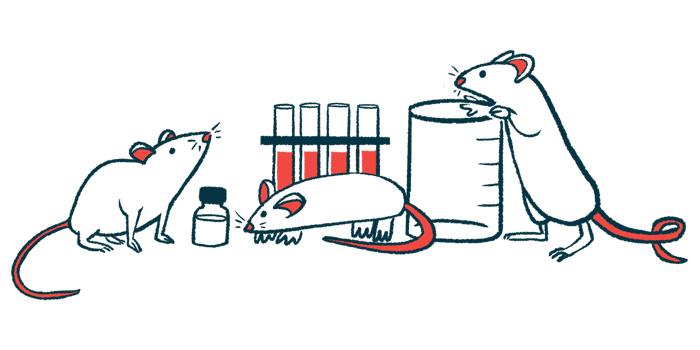MT-7117 Lowers Inflammation, Fibrosis in Scleroderma Mouse Model
The therapy's effectiveness is being tested in a Phase 2 clinical trial

The experimental therapy MT-7117 reduces lung inflammation, skin fibrosis (scarring), and blood vessel impairment in a mouse model of systemic sclerosis (SSc), a study found.
“MT-7117 demonstrates disease-modifying effects in preclinical models of SSc,” the researchers wrote. “The results of the present study suggest that MT-7117 is a potential therapeutic agent for SSc.”
The effectiveness and tolerability of MT-7117, developed by Mitsubishi Tanabe Pharma Corporation, are currently being investigated in a Phase 2 clinical trial (NCT04440592). Recruitment is ongoing in the U.S., Canada, and Europe.
The study, “Dersimelagon, a novel oral melanocortin 1 receptor agonist, demonstrates disease-modifying effects in preclinical models of systemic sclerosis,” was published in Arthritis Research & Therapy.
SSc, or scleroderma, is an autoimmune disease marked by inflammation, dysfunction of small blood vessels, and extensive scarring in multiple organs, including the skin and lungs. Currently approved treatments address SSc-associated interstitial lung disease (ILD), the leading cause of death in people with SSc, but there are no approved treatments for the condition itself.
The melanocortin receptor (MCR) is a family of proteins in various tissues in the body. It’s present on inflammatory cells, such as monocytes, as well as the skin and cells lining blood vessels, or endothelial cells. Previous studies showed activating MCR1 increases melanin production but suppresses inflammation. Melanin is a natural pigment that produces hair, eye, and skin pigmentation.
MT-7117, also known as dersimelagon phosphoric acid, is an oral drug that activates MC1R. It’s been shown to darken the skin of monkeys, but whether it can be an effective SSc treatment is unknown.
A research team that included scientists at Mitsubishi Tanabe Pharma investigated MT-7117’s effect on lung inflammation, skin scarring, and blood vessel impairment in a mouse model of SSc. They also assessed MT-7117’s impact on activating skin cells called fibroblasts and compared MCR1’s presence in skin biopsies from healthy donors and those with SSc.
SSc-like disease was induced by injecting bleomycin, a chemical that treats cancer but also causes scarring and inflammation, in mice. In the first set of experiments, the researchers administered oral MT-7117 and high-dose bleomycin to the mice daily for almost a month. As expected, the high-dose bleomycin caused weight loss, skin scarring, lung injury, and lung inflammation. Co-administration of MT-7117 inhibited skin scarring and lung inflammation in a dose-dependent manner, while also significantly improving body weight, however.
In another experiment, skin fibrosis was gradually induced over six weeks, with mice receiving bleomycin every other day for six weeks. MT-7117 was started three weeks after bleomycin administration and significantly inhibited the increase of skin thickness induced by bleomycin, and eased the loss of skin white adipose (fat) tissue.
Using human fibroblasts, the scientists found MT-7117 reduces fibrosis by blocking fibroblast activation through the transformation of growth factor (TGF)-beta, a protein known to promote fibrotic processes.
“The suppression of human fibroblast activation by MT-7117 is considered to be an important result, demonstrating that MT-7117 exerts its anti-fibrotic effect by directly targeting fibroblasts and that it acts not only in animal models but also on human fibroblasts,” the researchers wrote.
MCR1 expression was similar in skin biopsies of healthy donors and people with SSc, regardless of scleroderma type. The protein was mainly found in immune cells called monocytes and macrophages, but is also in fibroblasts, endothelial cells, and neutrophils.
The scientists found MT-7117 reduces inflammation and fibrosis, mainly by reducing inflammatory cell activation and the production of the pro-inflammatory molecule interleukin-6.
“There was also evidence that MT-7117 suppressed vascular dysfunction by acting on endothelial cells. Moreover, MT-7117 showed an anti-fibrotic effect by suppressing fibroblast activation,” the investigators wrote. “In view of its potent beneficial impact on all three cardinal pathologies of SSc, MT-7117 is a potential therapeutic agent for the treatment of clinically challenging SSc, which has diverse and difficult to treat symptoms.”







